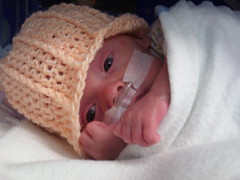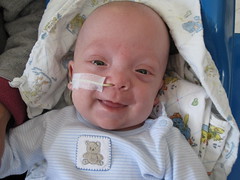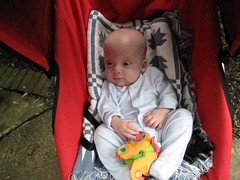Max seems to have really woken up in the past 36 hours. Last night when I was there I noticed him arching his back, looking very uncomfortable and crying loudly, looking, in other words like a baby with really severe reflux. Carolyn saw much the same today: Max would get very hungry in advance of his feed, he would suck greedily on a bottle and then he would vomit the contents back up. Then the tube feed would start and he would be very uncomfortable, clearly suffering from reflux and vomiting parts of his feed back up. To think that we once worried he slept too much! He's awake and angry now.
To us, it seems that the HSC have lost control of Max's reflux. He was on a fairly precise regimen of drugs and feeding times at Georgetown, which seems to have slipped a bit at HSC. This isn't the HSC team's fault: shortly before Max graduated from Georgetown, the NICU team moved him to an unusual feeding schedule (every four hours rather than the standard three) and it seems that Max has gained enough weight that his drug doses are now low. Further, Max continues to be denied the comfort of sleeping on his stomach and his wedge while he recovers from his circumcision. As his "circ" heals and the HSC team revisit the medical strategy for controlling Max's reflux, we expect the current flare-up to subside. However, at the moment, Max is spending a lot of time yelling.
On the subject of the very minor surgical procedure Max had done just before leaving Georgetown, more than one nurse, at HSC and Georgetown, has commented to us that the circ looks really good; and, to be clear, they're not saying that it's healing cleanly (which it is), but that, specifically, the surgery seemed to have gone well. It's terrifying to think that some of these procedures don't go well.
While Carolyn was there, the HSC team had an impromptu meeting to discuss Max's serial vomiting. As with every meeting we've had with the HSC team since Max moved, today's group wanted to evaluate Max's intracranial pressure, thinking that his hydrocephalus was to blame. The NICU team would also immediately zero in on Max's hydrocephalus as the explanation for any distress, culminating in the famous episode where I spent several hours one Sunday arguing with a resident about whether a lumbar puncture to relieve intracranial pressure was really the appropriate treatment for a bout of constipation. It took the Georgetown team months to shift their focus away from Max's hydrocephalus to his reflux and other issues. And whenever a new service was called to consult, we had to endure a little lecture on how whatever symptom they'd been called in to help manage might be caused by Max's hydrocephalus. It was something of a running joke: every service wanted to blame the head. Increased pressure within the brain, it seems, can cause literally anything in a baby. But in the end, every doctor deferred to our judgment as to whether Max's personality had changed. This, it seems, is the real marker of ICP.
Finally, the occupational therapist came by. Max will see a physical or occupational therapist six times a week, with speech therapy interspersed throughout as well. This kind of heavy therapeutic intervention is one reason we wanted to move to HSC and we're glad to see it starting already. Indeed, the HSC therapists have managed to solve the mystery of Max's muscle tone. At Georgetown half the specialists thought he had high tone (i.e. was hypertonic) and the rest thought he had low tone (i.e. was hypotonic). The HSC team think that Max has both high and low tone. His trunk is floppy while his extremities, mainly his hands and feet, have high tone. This is a sign of faulty wiring between the brain and the body. In effect, the brain is yelling at the body to tighten up but only the extremities are getting the message. As the brain sees the trunk sleeping on the job it yells louder, causing the hands and feet to tighten further. There seem to be a few therapies for this, but it's not yet clear whether they're palliative or, potentially, able to resolve the dysfunctional relationship between Max's brain, which feels betrayed by his body, and his body, which feels bullied by his brain.
skip to main |
skip to sidebar

Max was born in October 2008 at Georgetown University Hospital. After more than four months at GUH, Max moved to the HSC Pediatric Center in March 2009. He came home six months after he was born, in April 2009.
A TUBE-FREE MORNING

Start Here: A list of posts with background information
- We're home! (leaving the hospital with Max)
- The hospital at home (what it's like to care for Max at home)
- Max in action (see Max do his tricks)
- How is Max? (update April 2009)
Most recent photos of Max
Blog Archive
-
▼
2009
(224)
-
▼
March
(39)
- Max, smiling
- Why don't we like orphanages
- Learning and forgetting
- Max at night
- Bath day, take two
- Bath day
- Max sleeping like a baby
- Max studies swallowing
- Going to Children's
- Max's big week continues
- Max's car ride to Children's
- Reminders from Georgetown
- Max too will ride the helter-skelter
- Max's new room
- Trip to the playroom
- Dr. Brown's Patent Medicine Bottle and Baby Soother
- Max catches a fish
- No "A" for effort
- Visiting day at HSC
- Blast from the past
- Carolyn passes the CPR test
- A quiet day
- CPR training video
- Shaky video day
- Laundry day at HSC
- Riding the 'J' train
- First family meeting at HSC
- Max's charm offensive begins
- HSC: Who, Where, What
- Everyone wants to blame the head
- First full day at HSC
- Graduating from the NICU
- The long good-bye
- Without a feeding tube
- Without a feeding tube
- Evening Update (3/3)
- Evening Update (Monday 3/2)
- Max taking a bottle
- Evening update (Sunday 3/1)
-
▼
March
(39)



